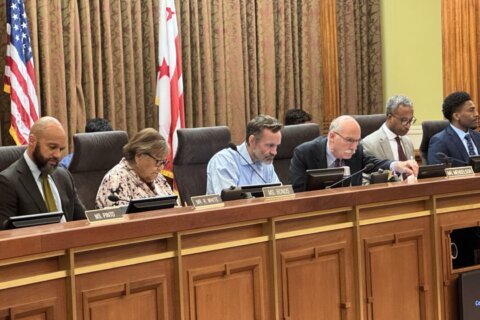Despite an order from Maryland’s Court of Appeals that Lee Boyd Malvo be resentenced for his six murder convictions for the 2002 Beltway sniper spree, Montgomery County prosecutor John McCarthy tells WTOP it’s unclear when, or if, the resentencing in Maryland will occur.
On Friday, Maryland’s highest court ruled Malvo must be resentenced for his Montgomery County convictions. In 2006, a Montgomery County Circuit Court judge sentenced Malvo to six life sentences without the possibility of parole for his Maryland crimes, after Malvo pleaded guilty for his role in the killing of six people in Montgomery County.
Malvo is currently serving four life terms in Virginia. According to the panel’s opinion, Malvo’s resentencing may be an “academic question” since he would have to be granted parole in Virginia before beginning to serve his consecutive life sentences in Maryland.
McCarthy suggested he’s not certain Malvo will ever be resentenced in Maryland: “We would not see him, likely, for resentencing, until after he finishes his sentences in Virginia.”
Since Malvo’s conviction and sentence, the Supreme Court and other courts have made rulings that take into consideration sentences for juvenile offenders. Malvo, now 37, was 17 at the time of the shootings.
A juvenile can no longer be sentenced to life in prison without the possibility of parole, unless the sentencing judge reflected “permanent incorrigibility.” The Court of Appeals ruling, by a 4-3 majority, overturned the Montgomery County sentencing, because the trial judge didn’t specify that Malvo’s crimes were based on “irreparable corruption.”
“We now need to study this and other Supreme Court decisions, to determine whether or not we believe he’s still eligible for life without the possibility of parole,” McCarthy said. “I think, if we believe as a matter of law that he is [eligible for life without the chance of parole], I think we would seek that.”
McCarthy says the severity of the crime and its fallout can not be understated. “I know the profound effect this matter had on the families of victims and the entire community, so we would be giving consideration to that.”
McCarthy was asked if Malvo’s willingness to plead guilty to the Maryland crimes and testify against John Allen Muhammad would be considered in whether prosecutors again seek a life sentence.
“I think the fact that he did cooperate in the prosecution of John Muhammad would be a factor that would have to be considered,” said McCarthy. “Obviously, announcing remorse is a question that we would need to explore to determine whether that’s a truly held position.”
McCarthy said Malvo’s cooperation and statements of remorse “necessarily would be considered by the court, based on the the new laws that have been announced by the Supreme Court.”
In 2017, Malvo filed a motion to correct what he claimed was an illegal sentence under a Maryland law, based on a 2012 U.S. Supreme Court ruling barring mandatory life sentences without parole for juvenile offenders.
In 2021, the Maryland General Assembly abolished life sentences without parole for juveniles, overriding a veto by Gov. Larry Hogan. Virginia passed a similar law.
Maryland’s Juvenile Restoration Act, or JUVRA, states that people who have served at least 20 years of a sentence for a crime committed when they were under the age of 18 can file a motion asking the circuit court to reduce their sentence.
In October 2019, Malvo’s lawyers argued before the U.S. Supreme Court that he should be resentenced for his Virginia crimes.
However, after Virginia Gov. Ralph Northam signed the law banning life sentences without the possibility of parole, Virginia’s solicitor general and Malvo’s lawyer asked the nation’s highest court to dismiss the case, since the life-without-parole sentence no longer exists. In February 2020, the U.S. Supreme Court dismissed the Malvo case.








